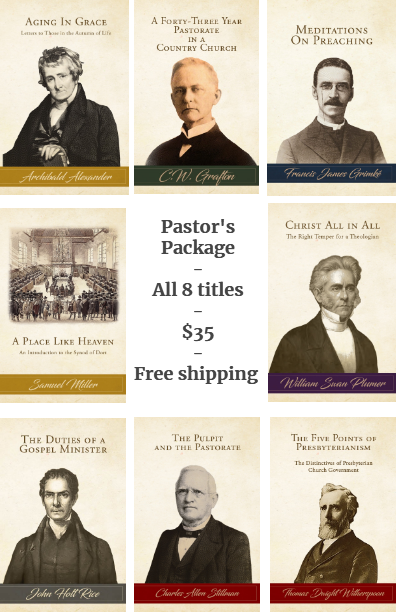(Receive our blog posts in your email by clicking here. If the author links in this post are broken, please visit our Free PDF Library and click on the author’s page directly.)
C. C. Jones begins the body of his book The History of the Church of God During the Period of Revelation with the reminder that the Bible doesn’t start with argument but with assertion, and it doesn’t appeal to reason but to faith. We receive by faith the truths that there is a personal God distinct from creation, and that the heavens and the earth are not eternal. To these truths our reason and our conscience give unqualified assent.
The great end of all created things, and thus of the Church itself, is the glory of God. This church is not made up of all mankind, but of a part only - and at some point in time this part was separated from the rest of humanity. The early parts of Genesis show us the events leading up to the church being set apart as the people of God.
Jones first considers the creation of man in his primitive, perfect state. Man was made in the image of God - but of what did this image consist? Jones contends that it did not consist in his body, as wonderful as it is, since God is without a body. Rather, it consisted in the rational, immortal, and accountable soul, which was immediately created by God and not from any preexisting matter (as was the body). “The body, with all its powers and members, is but the instrument of the soul, “a tabernacle in which it dwells while conversant with this lower world” (17). Clearly Jones believed in the resurrection of the body, but he does not at this point in his book connect that truth to the embodied state of man at creation.
The likeness of the soul to God is found in its spiritual nature (it is immaterial and immortal); in its knowledge (of the created world, of God, and of his law); in righteousness; in holiness; in happiness; and in dominion over the creation. Jones’ discussion of the knowledge of Adam in the Garden is worth quoting in full:
This understanding [God] called into exercise immediately after his creation, and also inspired him with an amount of knowledge, which at that time he could have obtained in no other manner. For example, He revealed Himself to man, and inspired him with a knowledge of Himself as his God and Creator. He inspired him with a knowledge of all the beasts of the field, and every green thing suitable for food, and of times and seasons, and the methods of cultivating, dressing, and keeping the garden of Eden; of the origin of Eve, of the nature, the tender devotion and perpetuity of the marriage relation, and its precedence over any other relation which might exist among men. But what is of special interest to us, his knowledge extended to all his relations to God and to his companion, and consequently to all his duties growing out of those relations. In a word, he had the law of God written in his heart, which, in the absence of a written revealed law, is denominated the law of nature; and such was the extent of his knowledge in respect to God and his duties, and such the correctness of the operations of his understanding and the purity of his conscience, that he needed no other teacher beyond himself. He was a law unto himself. He knew how to regulate his heart and life that he might be acceptable to God. He was not created and thrown an infant upon the world, but a full-grown man in the perfect maturity of his powers, both of mind and body, and that mind enlightened and expanded, free from every defect, and set in healthful motion by the inspiration of the Almighty, and by his immediate presence and communion. Col. iii. 10. (18)
It’s also worth hearing how Jones’ describes the happiness of man as created in the image of God: “So man is like Him in this respect also; for, as a result of the purity and perfection of his nature, and the just and holy exercise of all his powers, both of body and mind, he was happy. Yet not happy in and of himself, as God is; for he is but a creature, and his turning and consecration must be to God, who alone could be his satisfying and exhaustless portion. His chief end therefore was to glorify and enjoy Him, and while he attained that end he was happy” (19). By implication, to turn away from God and toward sin would lead only to misery.
The primitive and perfect state of man is proven not only by the history of his creation, but also from his ruin, and his redemption in Christ - to be reintroduced into the favor and presence of God, the lost image of God must be restored in the soul of man. Jones does not focus much upon the image of God that is retained after the fall (although surely he would affirm that spirituality and dominion, as well as knowledge in some sense, remain in fallen man), but gives his attention primarily to that image of God lost in the fall and repaired in redemption. This is not surprising, given the similar emphasis in the Westminster Standards; but it is unfortunate, given the discrimination made even by the Westminster divines in their individual writings. One hopes that as he expounds mankind in the state of sin, as well as the Noahic covenant, he will take notice of the fact that man is still in the image of God even after the fall.
Join us again soon as we continue to work out way through this book!

